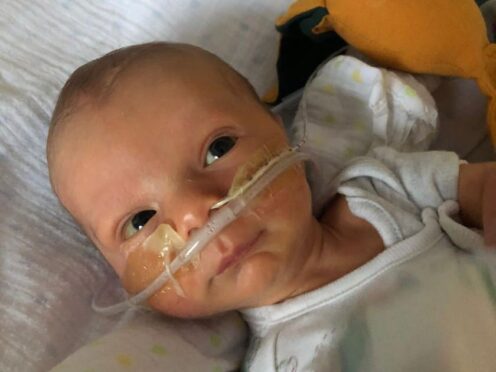
The parents of a 14-day-old baby boy who died after “lost opportunities” are joining calls for a public inquiry into maternity care.
In a statement after an inquest into their son’s death, Robyn and Jonny Davis said they have waited an “agonising” two and a half years for the proceedings with delays adding to their anguish.
Orlando Davis was born at Worthing Hospital, part of University Hospitals Sussex NHS Foundation Trust, on September 10 2021, but died of a fatal brain injury after just two weeks.
Concluding the inquest on Thursday, coroner Penelope Schofield said neglect contributed to his death after Mrs Davis developed a rare condition during labour that went unrecognised.
The couple, from Steyning, West Sussex, said: “Whilst nothing will ever bring Orlando back, we’d like to thank the senior coroner for acknowledging that this is a case where there has been a gross failure to provide basic medical attention, and finding that these gross failures amounted to neglect.

“As hard as it is to look forward at this moment, we’re joining the call for a national public inquiry into maternity care across England.”
The pair added: “What scares us, is that this is not an isolated incident and we know of many other families going through this same agony.”
The inquest in Chichester heard how Mrs Davis “did not feel safe” during labour and claimed midwives failed to act when she tried to raise fears that “something was wrong”.
Ms Schofield said that the former midwife suffered hyponatraemia which went unrecognised both during the planned home birth and when she was transferred to hospital.
The coroner said: “Failure to recognise this condition was fundamental.
“I do find a lack of inquiry or investigation into what Robyn was saying.”
Mrs Davis had opted for a home birth following the knowledge it was a low-risk pregnancy, but the 28-year-old said she felt she had not been listened to by the midwives when she raised concerns about her fluid intake and the position of the baby.
The court had heard as complications arose during the labour, Mrs Davis was transferred to hospital as she began to suffer seizures.
Recording a narrative conclusion at the inquest, Ms Schofield, said: “On September 9 2021, Robyn Davis developed hyponatraemia during her labour while having a home birth.

“Robyn’s condition went completely unrecognised during the period of her labour and, therefore, did not receive the care and attention her and her son clinically required.
“There was a lack of understanding of this rare medical condition by midwives and clinicians and as such there were lost opportunities to treat Robyn both at home and or during her subsequent submission to Worthing hospital.”
The coroner added the failure to recognise the condition resulted in Mrs Davis suffering a number of seizures, which restricted oxygen to Orlando before his birth and resulted in irreversible brain injury.
“Orlando’s death was contributed to by neglect,” the coroner said.
The coroner’s findings come after seven days of proceedings looking into Orlando’s death.
Ms Schofield also said she considered a contributing factor to Orlando’s death that there is no guidance of managing hyponatraemia in pregnancy and labour.
“While I appreciate the condition of hyponatraemia is rare, mothers place their lives and those of their newborns in the hands of professionals,” she said.
“While the trust have given evidence learned from Orlando’s death, the risk of hyponatraemia does not seem to form part of training, there still remains an ignorance nationally among professionals.
“Orlando’s death is one death too many.”
The coroner said she will write to the Department of Health and other professional bodies to raise the issue.
Mr and Mrs Davis, who have two other children, are suing the hospital in a separate case assisted by birth injury claims specialist Laura Cook, of CL Medilaw.
Following the inquest, Ms Cook said: “The evidence heard throughout this inquest is yet another shocking example of how basic failures in maternity care have led to another tragic death of an otherwise healthy and full term baby.
“Despite hyponatraemia of the severity seen in Robyn and Orlando being rare, it is nonetheless the case that they should never have got to that point.”
Chief nurse Maggie Davies, from the hospital trust, said: “We wish to offer our sincere condolences to Orlando’s family once more for the unimaginable heartache and distress caused by the loss of their baby boy.
“As the coroner noted in her findings, hyponatremia is an extremely rare condition which is little understood. We support her view that there is an urgent need for new national guidelines.
“This tragedy has deeply affected everyone involved in the family’s care, and led directly to us introducing new guidance and training within our maternity service.”

Enjoy the convenience of having The Sunday Post delivered as a digital ePaper straight to your smartphone, tablet or computer.
Subscribe for only £5.49 a month and enjoy all the benefits of the printed paper as a digital replica.
Subscribe